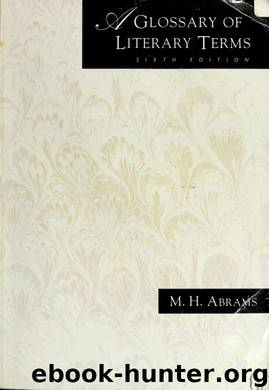A glossary of literary terms by M. H. Abrams

Author:M. H. Abrams
Language: eng
Format: epub
Tags: Criticism -- Terminology, Literature -- Terminology, English language -- Terms and phrases
Publisher: Harcourt, Brace, Jovanovich
Published: 1988-08-05T16:00:00+00:00
PERIODS OF ENGLISH LITERATURE
149
called "periods." The exact number, dates, and names of these periods vary, but the list below conforms to widespread practice. The list is followed by a brief comment on each period, in chronological order.
450-1066 Old English (or Anglo-Saxon) Period 1066-1500 Middle English Period 1500-1660 The Renaissance
1558-1603 Elizabethan Age
1603-1625 Jacobean Age
1625-1649 Caroline Age
1649-1660 Commonwealth Period (or Puritan Interregnum) 1660-1785 The Neoclassical Period
1660-1700 The Restoration
1700-1745 The Augustan Age (or Age of Pope)
1745-1785 The Age of Sensibility (or Age of Johnson) 1785-1830 The Romantic Period 1832-1901 The Victorian Period
1848-1860 The Pre-Raphaelites
1880-1901 Aestheticism and Decadence 1901-1914 The Edwardian Period 1910-1936 The Georgian Period 1914- The Modern Period
1945- Postmodernism
Old English Period, or the Anglo-Saxon Period, extended from the invasion of Celtic England by Germanic tribes (the Angles, Saxons, and Jutes) in the first half of the fifth century to the conquest of England in 1066 by the Norman French under the leadership of William the Conqueror. Only after they had been converted to Christianity in the seventh century did the Anglo-Saxons, whose earlier literature had been oral, begin to develop a written literature. (See oral formulaic poetry.) A high level of culture and learning was soon achieved in various monasteries; the eighth-century churchmen Bede and Alcuin were major scholars who wrote in Latin, the standard language of international scholarship. The poetry written in the vernacular Anglo-Saxon, known also as Old English, included Beowulf (eighth century), the greatest of Germanic epic poems, and such lyric laments as "The Wanderer," "The Seafarer," and "Deor," all of which, though composed by Christian writers, reflect the conditions of life in the pagan past. Caedmon and Cynewulf were poets who wrote on biblical and religious themes, and there survive a number of Old English lives of saints, sermons, and paraphrases of books of the Bible. Alfred the Great, a West Saxon king (871-99) who for a time united all the kingdoms of southern England against a new wave of Germanic invaders, the Vikings, was no less important as a patron of literature than as a warrior. He himself translated into Old English various books of Latin prose, supervised translations by other hands, and instituted the Anglo-Saxon Chronicle, a continuous record, year by year, of important events in England.
See H. M. Chadwick, The Heroic Age (1912); S. B. Greenfield, A Critical History of Old English Literature (1965); C. L. Wrenn, A Study of Old English Literature (1966).
Download
This site does not store any files on its server. We only index and link to content provided by other sites. Please contact the content providers to delete copyright contents if any and email us, we'll remove relevant links or contents immediately.
| Administration | Assessment |
| Educational Psychology | Experimental Methods |
| History | Language Experience Approach |
| Philosophy & Social Aspects | Reform & Policy |
| Research |
The Art of Coaching Workbook by Elena Aguilar(51158)
Trainspotting by Irvine Welsh(21636)
Twilight of the Idols With the Antichrist and Ecce Homo by Friedrich Nietzsche(18618)
Fangirl by Rainbow Rowell(9228)
Periodization Training for Sports by Tudor Bompa(8250)
Change Your Questions, Change Your Life by Marilee Adams(7753)
This Is How You Lose Her by Junot Diaz(6873)
Asking the Right Questions: A Guide to Critical Thinking by M. Neil Browne & Stuart M. Keeley(5752)
Grit by Angela Duckworth(5598)
Red Sparrow by Jason Matthews(5463)
Paper Towns by Green John(5175)
Room 212 by Kate Stewart(5102)
Ken Follett - World without end by Ken Follett(4720)
Housekeeping by Marilynne Robinson(4434)
The Sports Rules Book by Human Kinetics(4377)
Double Down (Diary of a Wimpy Kid Book 11) by Jeff Kinney(4257)
Papillon (English) by Henri Charrière(4256)
The Motorcycle Diaries by Ernesto Che Guevara(4088)
Exercise Technique Manual for Resistance Training by National Strength & Conditioning Association(4058)
